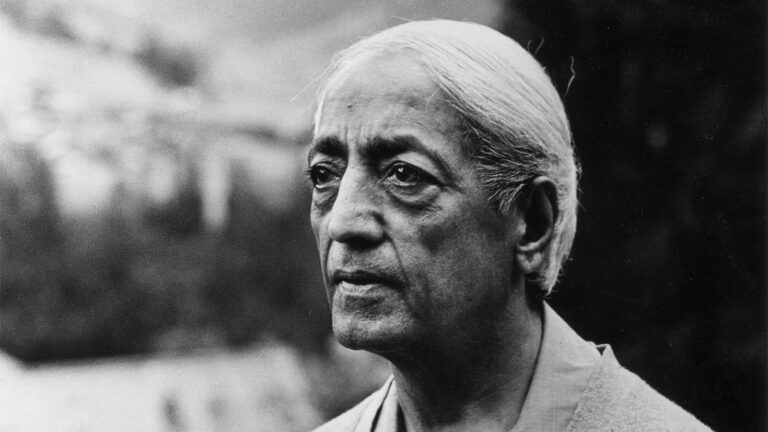Jiddu Krishnamurti, an eminent philosopher and spiritual teacher, devoted his life to exploring the nature of awareness and its profound impact on human consciousness. His teachings emphasize the importance of understanding the mind, questioning assumptions, and fostering a state of pure awareness free from the constraints of societal conditioning. In this article, we delve into Krishnamurti’s insights on awareness, drawing on his powerful words to illuminate his philosophy.
The Essence of Awareness
At the core of Krishnamurti’s teachings is the concept of awareness, which he describes as a state of attentive observation devoid of judgment or analysis. He asserts that true awareness arises when the mind is quiet, free from the incessant chatter of thoughts and preconceived notions.
“To be aware is to watch, to observe, without any choice, without any desire to change what is. Just observe, not try to modify it, not try to suppress it or translate it.” — Jiddu Krishnamurti
Krishnamurti’s emphasis on non-judgmental observation underscores the importance of seeing things as they are, without the interference of the ego or the influence of past experiences. This form of awareness allows individuals to connect with the present moment fully and genuinely.
The Role of Thought and Conditioning
Krishnamurti often highlighted the role of thought in shaping human experience and its limitations in achieving true awareness. He argued that thought is a product of the past, rooted in memory and experience, and therefore cannot grasp the new or the unknown.
“Thought is the response of memory, and memory is always old. Therefore, thought is always old. Thought can never be free because it is always from the past.” — Jiddu Krishnamurti
By recognizing the limitations of thought, individuals can begin to understand the constraints imposed by societal conditioning. Krishnamurti believed that society conditions individuals to think and behave in certain ways, leading to conformity and a loss of genuine awareness.
“We are second-hand people. We have lived on what we have been told, either guided by our inclinations, our tendencies, or compelled to accept, driven by circumstances and environment.” — Jiddu Krishnamurti
Breaking free from this conditioning requires a deep understanding of oneself and the nature of thought. This self-awareness is a critical step towards achieving a state of pure awareness.
The Art of Seeing Without Interference
Krishnamurti’s teachings often revolve around the idea of seeing without interference — perceiving reality without the filters of prejudice, fear, or desire. He believed that this form of seeing leads to true understanding and insight.
“To see clearly is not only to look with the eyes but also to observe with the mind. This observation is not the result of any effort. It is effortless awareness.” — Jiddu Krishnamurti
Effortless awareness, according to Krishnamurti, is a state where the observer and the observed are not separate. In this unified state of perception, there is no distortion caused by personal biases or emotional reactions.
The Importance of Meditation
For Krishnamurti, meditation was not a technique or a practice confined to specific times but a way of life. It involves a constant state of awareness and observation, leading to a profound understanding of oneself and the world.
“Meditation is not a means to an end. It is both the means and the end.” — Jiddu Krishnamurti
Through meditation, individuals can cultivate a heightened sense of awareness that permeates every aspect of their lives. This continuous awareness fosters a deeper connection with the present moment and a greater understanding of the nature of existence.
The Path to Freedom
Krishnamurti often spoke of awareness as the path to true freedom. This freedom is not merely the absence of constraints but a state of being where the mind is liberated from the past and the known, allowing for genuine creativity and insight.
“Freedom is found in the choiceless awareness of our daily existence and activity.” — Jiddu Krishnamurti
Choiceless awareness, a recurring theme in Krishnamurti’s teachings, involves observing life without the interference of personal will or desire. This form of awareness leads to a state of inner freedom, where one is no longer bound by the limitations of thought and conditioning.
Conclusion
Jiddu Krishnamurti’s teachings on awareness offer profound insights into the nature of the human mind and the path to true freedom. By embracing a state of non-judgmental observation, recognizing the limitations of thought, and practicing effortless awareness, individuals can transcend societal conditioning and connect with the present moment in a meaningful way. Krishnamurti’s words continue to inspire those seeking to understand themselves and the world through the lens of pure awareness.
“In the light of awareness, everything is revealed. And in that light, there is freedom.” — Jiddu Krishnamurti

What Are You Doing With Your Life
One of the world’s great philosophical teachers, Krishnamurti, offers his inspiring wisdom on many of life’s hurdles from relationships and love, to anxiety and loneliness. He answers such questions as ‘What is the significance of life?’ and ‘How do I live life to the full?’ to reveal the best way of being true to yourself. Read by millions from all walks of life, Krishnamurti shows us there is no path, no higher authority, no guru to follow, and that ultimately it is our own responsibility as to how we live our lives.



Comments are closed.